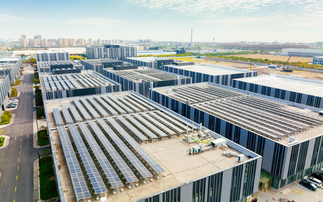OECD report says rich countries mobilised an average of $57bn to help poor countries tackle climate change since 2013
Rich countries are more than half way towards delivering $100bn per year to help poor countries tackle the worst impacts of climate change, with climate finance reaching $62bn in 2014, according to a major new report.
In 2010, developed countries pledged to jointly mobilise $100bn annually in climate finance by 2020 to help developing nations adapt to extreme weather events and rising sea levels, as well as invest in low carbon technologies to curb carbon emissions.
A new report by the Organisation for Economic Co-operation and Development (OECD) in collaboration with Climate Policy Initiative (CPI), published today, shows significant progress has been made in meeting the goal, but much work is still needed.
Preliminary figures show climate finance reached $52bn in 2013, rising to $62bn in 2014, averaging at $57bn annually over the two years. Much of the increase between the two years was from Multilateral Development Banks (MDBs) such as the World Bank.
The study was commissioned by Peru and France, presidents of the 2014 and 2015 UN climate change summits, who wanted to provide clarity on a key component of the negotiations.
OECD Secretary-General Angel Gurría said the findings "painted an encouraging picture". However, he added that further work was needed to improve the methodology of the study, which had been produced relatively quickly.
The report excludes all finance relating to coal projects even though Japan and Australia have labelled funding for high efficiency coal plants as a form of climate finance.
The study was unveiled in Lima, Peru, where finance ministers are tomorrow expected to meet for a major climate finance ministerial summit to discuss how best to scale up funding.
Jonathan Taylor, European Investment Bank Vice President, said the OECD's findings were crucial in the run up to the Paris climate change talks and during this week's session in Lima. In an emailed statement, he told BusinessGreen they provided "a valuable contribution to better understanding the flows relating to climate finance".
In recent weeks, leading economies including the UK, France and China have announced billions of dollars in climate finance to support the target. But countries have consistently maintained that the private sector will need to play a major role in achieving the goal.
The report shows that in 2013, public finance made up 71 per cent of the total, with mobilised climate funding accounting for 26 per cent. However, the OECD said it was unable to draw any findings or predictions on the future balance between public and private climate finance.
Beyond the $100bn goal, studies estimate that trillions of dollars of investment will be required for climate mitigation and adaptation around the world. More than $6tr annual investment is required for new low carbon infrastructure each year, according to The Global Commission on the Economy and Climate, and at least $150bn is needed each year by 2025 to help boost the resilience of existing infrastructure, says the UN's Environment Programme (UNEP).
Speaking in Lima today, Professor Lord Nicholas Stern, urged development banks to do more to increase investment in sustainable infrastructure, particularly in developing and emerging economies. He said multilateral development banks will need to increase infrastructure lending five-fold over the next decade from around $30-40bn per year to over $200bn.
"Done well this could leverage much larger sums from the private sector and could make a crucial contribution to sustainable growth and the low-carbon transition," he said.
"Multilateral development banks can also help in shaping the clear and credible policies which are necessary to generate the confidence necessary for private investors. The banks should focus on mobilising private finance, simplifying application procedures to speed up project approval, and help with policies to phase out fossil fuel subsidies."
This article is part of BusinessGreen's Road to Paris hub, hosted in association with PwC









